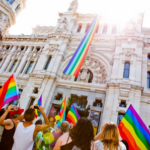Two recent news reports form the main body of this story, one from the ‘Los Angeles Times’ (April 2002) and the other from the ‘Washington Blade’ (December 2001). Two more similar stories about the recurrence of Pashtun homosexuality, from the New York Times (February 2002) and Times of London (January 2002), can be found in the Afghanistan News & Reports 2002-04 .
“Homosexuality and Lesbianism have no place in Islam. This issue is clear from the primary source of Islam, The Holy Quran. No Muslim scholar, Imam or a leader of a Muslim community can alter this injunction. A person committing such an act is in violation of God’s Law and should seek repentance before God gives up on him or her. It was the people of prophet Lot (peace be on him) who started this evil act and were severely punished by God.”
So proclaims a vigorously religious ‘imam’ from his Internet pulpit, making clear the position of the vast majority of Muslims regarding homosexuality.
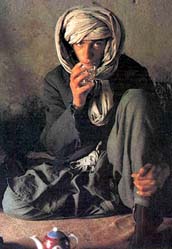
From the western shores of ancient Morocco across thousands of sandy Islamic miles to the far eastern islands of Indonesia, almost half the distance of our known world, homosexual behavior is pronounced anathema to the faithful. The sweep of condemnation of same-gender love is about equal to the sweep of eastern and western Christianity in the other half of the world. So the world, one would think, should be shorn of such an abomination wherein a man layeth with a man as a woman.
Sex and Scripture
Except it’s not. And the simple reason is that both of these imposed belief systems ignore and deny the natural varieties of the human psyche. There has always been heterosexual attraction and there has always been homosexual attraction.
To elevate and validate one over the other is to praise the left eye over the right eye. But simple and superstitious scribes of these faiths have written reams of florid, passionate and volcanic verses that embrace an artificial dichotomy of homo-and-hetero sexual and emotional orientation. Had they consulted the sentient beings in their tribes instead of magical and mystical oracles, burning bushes or delusional visionaries, the scribes might well have written more humane and precise books. Homoerotic affections, legends and myths run deep into the human heart and far back into the haze of history.
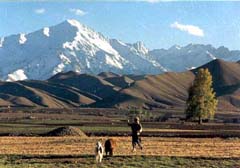
Besides its natural occurrence in our genes and neurons, another reason homosexual behavior and desire has not been stamped out by every conceivable type of secular cure and sacred persecution is that homosexuality serves both religion and culture well. It is perhaps one of the great anthropological paradoxes (if not hypocrisies) that the history and behavior of homosexuality has been carried down through fifteen centuries by gender-segregated Muslim cultures and, as well, by male Christian monastic confederations. (Does anyone seriously believe that sexual favors between altar boys and clerics began in the 20th century?) Men serving men is as old as the species and is found in many sacred and secular societies from the ancient Egyptians and Chinese to the sportive and warrior ranks of Greeks and Romans.
A thoughtful reader who engages in cross-cultural studies will not get far before they discover what many western lesbigay people already know about the indigenous and hidden homosexual tradition practiced, in local varieties, by countless unmarried and married men in Arab/Muslim countries.
In these cultures, homosexual activity serves as a temporary (yet valid and important) proxy stage of growth between puberty and marriage. Since there is varying but distinct social separation of the genders in these Muslim states, teen/young adult men develop special friendships and informal partnerships with other males, some older, some younger.
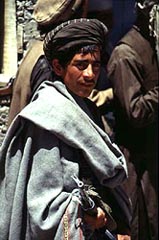 Within these dyads most adolescents have their first sexual experiences as they ‘practice’ on each other. Usually the younger partner takes the passive role and the older one the active role. Eventually, in their twenties and early thirties, most go on to exclusive heterosexual marriage. Others, to be sure, go on to marriage but maintain secret sexual liaisons with other men. Often these are men (and women) who are more truly attracted to their own gender but would not dare to reveal it.
Within these dyads most adolescents have their first sexual experiences as they ‘practice’ on each other. Usually the younger partner takes the passive role and the older one the active role. Eventually, in their twenties and early thirties, most go on to exclusive heterosexual marriage. Others, to be sure, go on to marriage but maintain secret sexual liaisons with other men. Often these are men (and women) who are more truly attracted to their own gender but would not dare to reveal it.
Social Sexual Studies
In 1997, an important book was published on this matter. ‘Islamic Homosexualities: Culture, History, and Literature’ in which Stephen O. Murray and Will Roscoe, along with eight other authors, analyze the sexual shadows of Islam. One reviewer, Daniel Pipes of the Middle East Forum in Philadelphia wrote the following appraisal of the book:
“As with so much else in the sexual realm, Islamic norms differ profoundly from Western ones. The authors establish several points: (1) Islam treats homosexuality far less harshly than does Judaism or Christianity. (2) Sex between men results in part from the segregation of women and in part from the poetic and folk heritage holding that the penetration of a pretty boy is the ultimate in sexual delight. (3) Sex between men is “frowned upon, but accepted” so long as the participants also marry and have children; and also if they keep quiet about this activity. (4) The key distinction is not hetero vs. homosexual but active vs. passive; men are expected to seek penetration (with wives, prostitutes, other males, animals); the only real shame is attached to serving in the female role. (5) Youths usually serve in the female role and can leave behind this shame by graduating to the male role. (6) The great Muslim emphasis on family life renders homosexuality far less threatening to Muslim societies than to Western ones (Muslim men seeking formally to marry each other remains unimaginable).”
Dominant Sex with Boys
As if, coincidentally, to prove the validity of the Murray and Roscoe book, three recent stories about sexual practices in Afghanistan–usually a subject too sensitive for public discussion–came boldly from the ‘Times of London’, the ‘New York Times’ and the ‘Los Angeles Times’. Each report portrays a custom of social/sexual behavior that stretches back into the thin pages of history.
As seen through today’s more politically-correct-sexually-sensitive-Judeo-Christian-western lens, the articles describe a sexual practice that falls outside most standards of acceptable behavior. This is, for some, an unsettling account describing the ‘taking’ of teen/young adult boys by strong-willed men–born into and hardened by the harsh conditions of war, deprivation, bloodshed and death–for the purposes of sexual pleasure and trophy gloating.
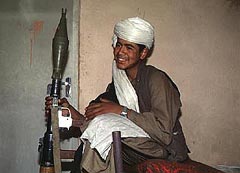 Nevertheless, these male-to-male conjunctions generally follow along old Arabic traditions. In most modern Islamic ‘cultural’ (premarital) homosexual behavior there is a mute understanding that sex is mutually consensual, temporary and that it’s a form of companionship, if not affection, among peers.
Nevertheless, these male-to-male conjunctions generally follow along old Arabic traditions. In most modern Islamic ‘cultural’ (premarital) homosexual behavior there is a mute understanding that sex is mutually consensual, temporary and that it’s a form of companionship, if not affection, among peers.
But an apparent distinction seems evident in this particular Kandahar variation as reported in the newspaper articles quoted below. The dating and courtship appears more coercive, more opportunistic and seems to take advantage of younger guys who almost have no other choice than to accept the money or gifts from bigger and more powerful ‘commanders’ whose bit of authority is bestowed by their gang-member status, their guns and the shattered legal/police system. The news reporters report did not (and could not) probe into the thoughts of these youthful men as they submit to these older ‘patrons’.
A young native of Kandahar now living in Kabul was recently asked about these arangements. He replied that the older guys throw lavish parties where they “marry” their boytoys, showering them with gifts, especially weapons! Generally one guy is 15-20 years older than the other. The relationships can sometimes be very intense, and tend to last 5-6 years until the boy grows up and marries a woman.
(To be sure, there are many Kandaharis who oppose the practice. But poverty and power have always played crucial roles in shaping cultural behavior.)
Whether the activity is mutual or forceful, there is an almost universal attitude in these eastern cultures that such sexual indulgence is not ‘gay’, that is, it’s not sex or love between two men who identify as homosexuals. (In Afghanistan it’s common for the older participants to be married with kids.) Rather, in a collective mental shell game the meaning of sex is re-framed: heterosexual men engage in homosexual behavior in which the younger guy is not a ‘fem’ but obedient and passive and the older one is not a ‘butch queer’ but assertive and active.
What eventually happens to these Kandahar relationships? Some fade away, some stop when one partner marries or moves away, and some continue for years. In other other Muslim countries, the roles eventually change. As the older ones marry, the younger ones mature and become the dominant partner to a younger submissive friend. Or, as the reporter from the Los angels Times wrote,
“sometimes when the halekon <young male lovers> grow up, the older men actually try to keep them in the family by marrying them off to their daughters.”
(To many western ‘gay culture’ observers, all this seems at first glance to be denial and self-deception. It stirs up, again, intriguing issues of homosexual identity vs homosexual behavior: does behavior define identity or is identity separate from behavior–and how do behavior and identity interface with sexual orientation…?)
Islamic ‘Human Rights’
Framing all this role-playing and sexuality is another important facet of the Islamic prism to keep in mind as the ‘Times’ story is read. Despite the man-in-the-street assertion that Islam preaches love and peace among neighbors and strangers alike, Islamic governments over the course of history have often proven to be harsh and authoritarian. Little value has been put upon the dignity and rights of the individual. Expressions of protest, legal recourse and fairness, and gender equality have been poorly served by many of the domineering male-ruled governments under the flag of Islam. (Indeed, the Christian west is hardly free of its share of oppressive rulers and statutes as well.)
In another one of many recent books about Islam, Ann Elizabeth Mayer has written ‘Islam and Human Rights: Tradition and Politics’ (1998), in which she compares Islamic law with international human rights laws and concludes that these two are not compatible. This she attributes to the belief that Islam is divinely commanded from God and criticizing it is considered blasphemous.
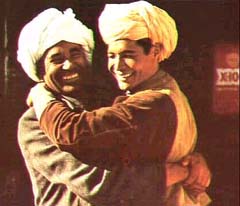 The author goes on to make an unsettling observation: “Islamic ‘human rights’ can offer no means for protecting the individual against state-approved Islamic laws and policies that violate international human rights laws.” Thus, Muslim theocratic states exist by asserting Islamic law over secular humanitarian law at the cost of freedoms of their citizens, female and male. The result is that violations of international human rights, especially for women and gays, are justified by oppressive governments using the ‘higher’ Koranic dictates.
The author goes on to make an unsettling observation: “Islamic ‘human rights’ can offer no means for protecting the individual against state-approved Islamic laws and policies that violate international human rights laws.” Thus, Muslim theocratic states exist by asserting Islamic law over secular humanitarian law at the cost of freedoms of their citizens, female and male. The result is that violations of international human rights, especially for women and gays, are justified by oppressive governments using the ‘higher’ Koranic dictates.
With these referents in mind, about traditional Islamic sexuality and human rights concepts, the ‘Times’ story is reprinted here with its observations and conversations heard on the Taliban-free streets of Kandahar. (This was once the capital of the extremist leader Mullah Omar who rode around in expensive SUV’s listening to CD’s while dictating to the impoverished faithful that the playing of music was sinful.)
(1)
Los Angeles Times
April 3, 2002
Kandahar’s Lightly Veiled Homosexual Habits
Society: Restrictions on relations with women lead to greater prevalence of liaisons between men, a professor says.
By MAURA REYNOLDS, KANDAHAR, Afghanistan
In his 29 years, Mohammed Daud has seen the faces of perhaps 200 women. A few dozen were family members. The rest were glimpses stolen when he should not have been looking and the women were caught without their face-shrouding burkas.
“How can you fall in love with a girl if you can’t see her face?” he asks.
Daud is unmarried and has sex only with men and boys. But he does not consider himself homosexual, at least not in the Western sense. “I like boys, but I like girls better,” he says. “It’s just that we can’t see the women to see if they are beautiful. But we can see the boys, and so we can tell which of them is beautiful.”
Daud, a motorbike repairman who asked that only his two first names and not his family name be used, has a youthful face, a jaunty black mustache and a post-Taliban clean shaven chin. As he talks, his knee bounces up and down, an involuntary sign of his embarrassment.
“These are hard questions you are asking,” he says. “We don’t usually talk about such things.”
Though rarely acknowledged, the prevalence of sex between Afghan men is an open secret, one most observant visitors quickly surmise. Ironically, it is especially true here in Kandahar, which was the heartland of the puritanical Taliban movement.
It might seem odd to a Westerner that such a sexually repressive society is marked by heightened homosexual activity. But Justin Richardson, a professor of psychiatry at Columbia University, says such thinking is backward–it is precisely the extreme restrictions on sexual relations with women that lead to greater prevalence of the behavior.
“In some Muslim societies where the prohibition against premarital heterosexual intercourse is extremely high–higher than that against sex between men–you will find men having sex with other males not because they find them most attractive of all but because they find them most attractive of the limited options available to them,” Richardson says.
In other words, sex between men can be seen as the flip side of the segregation of women. And perhaps because the ethnic Pushtuns who dominate Kandahar are the most religiously conservative of Afghanistan’s major ethnic groups, they have, by most accounts, a higher incidence of homosexual relations.
Visitors might think they see the signs. For one thing, Afghan men tend to be more intimate with other men in public than is common in the West. They will kiss, hold hands and drape their arms around each other while drinking tea or talking.
Moreover, there is a strong streak of dandyism among Pashtuns males. Many line their eyes with kohl, stain their fingernails with henna or walk about town in clumsy, high-heeled sandals.
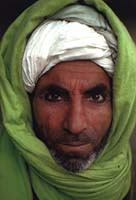 The love by men for younger, beautiful males, who are called halekon, is even enshrined in Pashtuns literature. A popular poem by Syed Abdul Khaliq Agha, who died last year, notes Kandahar’s special reputation. “Kandahar has beautiful halekon,” the poem goes. “They have black eyes and white cheeks.”
The love by men for younger, beautiful males, who are called halekon, is even enshrined in Pashtuns literature. A popular poem by Syed Abdul Khaliq Agha, who died last year, notes Kandahar’s special reputation. “Kandahar has beautiful halekon,” the poem goes. “They have black eyes and white cheeks.”
But a visitor who comments on such things is likely to be told they are not signs of homosexuality. Hugging doesn’t mean sex, locals insist. Men who use kohl and henna are simply “uneducated.” Regardless, when asked directly, few deny that a significant percentage of men in this region have sex with men and boys. Just ask Mullah Mohammed Ibrahim, a local cleric.
“Ninety percent of men have the desire to commit this sin,” the mullah says. “But most are right with God and exercise control. Only 20 to 50% of those who want to do this actually do it.” Following the mullah’s math, this suggests that between 18% and 45% of men here engage in homosexual sex–significantly higher than the 3% to 7% of American men who, according to studies, identify themselves as homosexual.
That is a large number to defy the strict version of Islam practiced in these parts, which denounces sex between men as taboo. Muslims seeking council from religious elders on the topic will find them unsympathetic. “Every person has a devil inside him,” says Ibrahim. “If a person commits this sin, it is the work of the devil.” The Koran mandates “hard punishment” for offenders, the mullah explains. By tradition there are three penalties: being burned at the stake, pushed over the edge of a cliff or crushed by a toppled wall.
During its reign in Kandahar, the Taliban implemented the latter. In February 1998, it used a tank to push a brick wall on top of three men, two accused of sodomy and the third of homosexual rape. The first two died; the third spent a week in the hospital and, under the assumption that God had spared him, was sent to prison. He served six months and fled to Pakistan.
Apparently to discourage post-Taliban visitors, the owners of a nearby house have begun rebuilding on the site. “A lot of foreigners came and started interviewing people,” says Abdul Baser, a 24-year-old neighbor, who points out the trench where the men were crushed. “Since then they have rebuilt the wall.”
But many accuse the Taliban of hypocrisy on the issue of homosexuality. “The Taliban had halekon <young male lovers>, but they kept it secret,” says one anti-Taliban commander, who is rumored to keep two halekon. “They hid their halekon in their madrasas,” or religious schools.
It’s not only religious authorities who describe homosexual sex as common among the Pashtuns.Dr. Mohammed Nasem Zafar, a professor at Kandahar Medical College, estimates that about 50% of the city’s male residents have sex with men or boys at some point in their lives. He says the prime age at which boys are attractive to men is from 12 to 16–before their beards grow in. The adolescents sometimes develop medical problems, which he sees in his practice, such as sexually transmitted diseases and sphincter incontinence. So far, the doctor said, AIDS does not seem to be a problem in Afghanistan, probably because the country is so isolated.
“Sometimes when the halekon grow up, the older men actually try to keep them in the family by marrying them off to their daughters,” the doctor says. Zafar cites a local mullah whom he caught once using the examination table in the doctor’s one-room clinic for sex with a younger man. “If this is our mullah, what can you say for the rest?” Zafar asks.
Richardson, the psychiatry professor, says it would be wrong to call Afghan men homosexual, since their decision to have sex with men is not a reflection of what Westerners call gender identity. Instead, he compares them to prison inmates: They have sex with men primarily because they find themselves in a situation where men are more available as sex partners than are women. “It is something they do,” he notes, “not something they are.”
Daud, the motorbike repairman, would concur that the segregation of women lies at the heart of the matter. He says his first sexual experience with a man occurred when he was 20, about the time he realized that he would have difficulty marrying. In Pashtuns culture, the man has to pay for his wedding and for gifts and clothes for the bride and her family. For many men, the bill tops $5,000–such an exorbitant sum in this impoverished country that some men, including Daud, are dissuaded from even trying.
“I would like to get married, but the economic situation in our country makes it hard,” Daud says. Daud talked about his sex life only in private and after being assured that no photos would be taken.
“I have relations with different boys–some for six months, some for one month. Some are with me for six years,” he says. “The problem is also money. If you want to have a relationship with a boy, you have to buy things for him. That’s why it’s not bad for the boy. Some relationships need a lot of money, some not so much. Sometimes I fix a motorbike and give it to him as a present.”
It is not easy to conduct homosexual affairs, he admits. Home is out of the question. “If my father were to find me, he’d kick me out of the house,” Daud says. “If you want to have sex, you have to find a secret place. Some go to the mountains or the desert.”
 Opinions differ as to whether homosexual practices in Kandahar are becoming more open or more closed since the Taliban was defeated. For instance, after anti-Taliban forces arrived in the city in early December, some Westerners reported seeing commanders going about town openly with their halekon. But that has changed in recent weeks since Kandahar’s new governor, Gul Agha Shirzai, issued an order banning boys under 18 from living with troops. Officially, the ban is aimed at ending the practice of using children as soldiers.
Opinions differ as to whether homosexual practices in Kandahar are becoming more open or more closed since the Taliban was defeated. For instance, after anti-Taliban forces arrived in the city in early December, some Westerners reported seeing commanders going about town openly with their halekon. But that has changed in recent weeks since Kandahar’s new governor, Gul Agha Shirzai, issued an order banning boys under 18 from living with troops. Officially, the ban is aimed at ending the practice of using children as soldiers.
“It is not that way,” says one of the governor’s top aides, Engineer Yusuf Pashtun, objecting to the insinuation that the boys may have been used for sex. The governor’s order said only that “no boys should be recruited in the army before the age of 18,” he adds.
Still, the anti-Taliban commander, who is close to Shirzai, acknowledged that one goal of the order was to keep halekon out of the barracks. The move simply drove the practice underground, he says.
Zafar, the doctor, says that in the community at large the Taliban frightened many men into abstinence. “Under the Taliban, no more than 10% practiced homosexual sex,” he says. “But now the government isn’t paying attention, so it may go back up to 50%.”
But Daud thinks the opposite may happen. If coeducation returns and the dress code for women eases, men will have fewer reasons to seek solace in the beds–or fields or storage rooms–of other men.
“As for me, if I find someone and see she is beautiful, I will send my mother over to her” to ask for her hand in marriage, Daud says. “I’m just waiting to see her.”
(End the ‘Times’ story)
Secrets and Traditions
Despite the apparent homosexual behavior of the men in the story, same-sex attraction is, paradoxically, scorned in the Afghan culture. Truly ‘gay’ men and women deeply hide their secrets and seek no attention. Homosexuality is not understood as anything natural or acceptable and the idea of mutual same-sex pleasure or romance is alien to the vast majority who have never encountered such ideas.
It’s impossible to accurately analyze the motives of the Pashstuns who favor young men. Most of these ‘daddies’ are essentially straight but, lacking status in their meager lives, feel a certain ‘swagger’ of social enhancement for having a trophy boy.
As for sexual pleasure it’s hard to say if it’s anything other than pleasurable anal penetration for the the dominant partner, his role being the same as with a woman; his masculinity remains unquestioned. It’s improbable he would reciprocate the pleasure for the submissive younger partner since it would mean being passive and therefore unacceptable to his manly self-image.
For some of these married-with-kids men, it’s also possible that some of them are really gay and this traditional conquest of younger guys serves their secret very well. It’easy to understand that such a partner would desire to go further than his straight peers in returning the pleasure–and possible romantic affection–to his companion. It would seem an ideal arrangement for a closeted person.
But even here the gay man runs a risk since the younger man is probably heterosexual and knows (after comparing notes with his own peers) the roles and limits expected of both of them. If the young one suspects the older one enjoys the intimacy too much too often or if he goes too far (perhaps switching psoitions) suspicions and rumors might arise. And there could hardly be a greater fear than being exposed as a homosexual and humiliated in front of one’s family, friends or community. For the authentic gay man, sexual desire can put him in harm’s way whether he lies about his truth or is truthful about his lie.
(2)
Washington Blade
December 21, 2001
New Afghan Rulers Better for Gays?
By Lou Chibbaro Jr.
In this story, there is no reference to specific sexual behavior. Rather it’s a larger overview of the new government’s hoped-for attitude toward legislating human rights to a long oppressed populace–including gay and lesbian citizens.>
WASHINGTON, D.C.: The interim government scheduled to take office in Afghanistan on Dec. 22 will discontinue executions of people charged with sodomy and will likely adopt a more tolerant policy on human rights for gays, according to a spokesperson for the Northern Alliance, the Afghan military faction that fought against the Taliban.
 Haron Amin, who appears frequently on U.S. television news programs on behalf of the Northern Alliance, said Dec. 18 that leaders of Afghanistan’s newly installed interim government are outraged over human rights abuses by the Taliban regime and will embrace the principles of human rights. “This issue [of anti-gay persecution] would have to be brought up in a court,” he said. “The Taliban killed people for all kinds of reasons, not just sexual orientation.”
Haron Amin, who appears frequently on U.S. television news programs on behalf of the Northern Alliance, said Dec. 18 that leaders of Afghanistan’s newly installed interim government are outraged over human rights abuses by the Taliban regime and will embrace the principles of human rights. “This issue [of anti-gay persecution] would have to be brought up in a court,” he said. “The Taliban killed people for all kinds of reasons, not just sexual orientation.”
The international human rights group Amnesty International has documented cases where Taliban authorities executed men charged with sodomy by using military tanks to topple cement walls on top of them, crushing them to death.
Amin said he could not predict how the new interim government would address specific human rights issues, such as anti-gay persecution, but said he was certain the government-sponsored abuses of women and minorities under the Taliban government would be discontinued. “The new administration will be much more tolerant,” he said.
Amin’s comments came as the Northern Alliance–in coordination with the U.S. bombing campaign–ousted the Taliban from power. The bombing was part of the U.S.-led war against terrorism that began after the Sept. 11 attacks on the World Trade Center and the Pentagon.
Several leading Afghan political factions, including Northern Alliance members, reached an agreement to form a post-Taliban, interim government following a series of meetings last month in Bonn, Germany. The factions selected Hamid Karzai, an ethnic Pashtun tribal leader with strong ties to the West, as the interim government’s prime minister. Karzai is scheduled to take office Saturday, Dec. 22.New leader more moderate?
Daniel Brumberg, a professor of government at Georgetown University’s school of international relations, said Karzai is known as a moderate who holds “secularist” views on the subject of religion and government. Brumberg said that while Afghanistan’s conservative, Islamic traditions would make it unlikely that Karzai would openly embrace gay rights, he said the changing conditions brought about by the ouster of the Taliban will enable Karzai to at least put an end to draconian practice such as summary executions of gays. “This will be a power-sharing government, so there may be a lessening of Islamic fundamentalism,” Brumberg said. “But it won’t be a secularist state any time soon.”
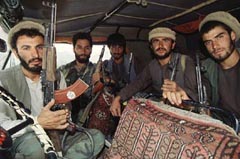 Since the United States began its war against terrorism in late September, gay rights advocates have expressed concern that many of the Arab and Islamic countries that signed on as coalition partners in the war routinely treat gays as criminals.
Since the United States began its war against terrorism in late September, gay rights advocates have expressed concern that many of the Arab and Islamic countries that signed on as coalition partners in the war routinely treat gays as criminals.
For example, some coalition partners, including Saudi Arabia, Yemen and the United Arab Emirates, have laws that call for the death penalty for sodomy, similar to the laws adopted by the Taliban regime in Afghanistan.
Gay rights organizations, including the International Lesbian & Gay Human Rights Commission, said they recognize the need for the United States to align itself with Islamic and Arab nations in the war against terrorism. But they said the United States and other Western allies should use their relationship with Arab and Islamic countries to persuade those governments to improve conditions for gays. The Bonn accord will help Human rights groups such as Amnesty International note that the so-called Bonn agreement, which established the framework for the interim government in Afghanistan, includes language calling for the establishment of an independent commission to monitor human rights and to investigate human rights violations.
The agreement calls for the United Nations to assist the commission. “Amnesty International believes there is some good human rights language in the Bonn text that can be built upon in the future,” said Alistair Hodgett, the group’s spokesperson. “References to human rights, social justice, international law, and the rule of law are particularly welcome.”
Hodgett said that while the Bonn agreement is silent on the question of anti-gay persecution, he is hopeful that the agreement’s call for the establishment of an independent judiciary and the creation of a pluralistic democracy would lay the groundwork for curtailing persecution of minorities, including gays.
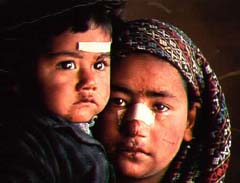 The U.S. government also plans to cite the Bonn agreement as a means of encouraging the new Afghan government to respect the human rights of all groups, said Richard Boucher, a spokesperson for the State Department.
The U.S. government also plans to cite the Bonn agreement as a means of encouraging the new Afghan government to respect the human rights of all groups, said Richard Boucher, a spokesperson for the State Department.
In a press briefing on Dec. 14, Boucher said human rights “has been very much a part” of the U.S. effort to bring about change in Afghanistan. “After the horrible excesses of the Taliban and some of the others who have been in Afghanistan, I think Afghans themselves understand this to be a critical issue,” Boucher said.
The human rights commission established under the Bonn agreement, Boucher said, calls on the new government to develop institutions to protect human rights. “And this remains an important goal of the United States,” he said.
Gay Muslims hopeful Faisal Alam, founder of the gay Islamic group Al Fatiha (http://www.al-fatih.net), said his group is monitoring the latest developments in Afghanistan and is cautiously optimistic that the climate for gays there will improve, at least somewhat.
“We know the new government is likely to continue Islamic traditions,” Alam said. “My feeling and my hope is the new government won’t kill gay people. But we are not likely to see gays supported.” Alam said that while groups have formed over the years representing gays in a number of Islamic countries, he is unaware of the existence of any gay Afghan group.
The lack of such an organization, and the lack of any visible presence of a gay community in Afghanistan, means that those who favor improvements in the treatment of gays in Afghanistan must direct their attention “to our own governments,” Alam said. “We should put pressure on the United States to take a stand on human rights for lesbians and gays in all countries, including Afghanistan,” he said.
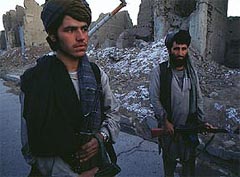 The Revolutionary Association of the Women of Afghanistan, which formed in the 1970s in opposition to the Soviet Union’s occupation of Afghanistan, has called for a secularist government with a complete separation of church and state.
The Revolutionary Association of the Women of Afghanistan, which formed in the 1970s in opposition to the Soviet Union’s occupation of Afghanistan, has called for a secularist government with a complete separation of church and state.
Alam and Michael Heflin, director of Out Front, an Amnesty International project that monitors anti-gay persecution, said RAWA’s strong human rights positions and its outspoken efforts to end discrimination against women in Afghanistan make the group a potential ally for Afghan gays.
The group’s extensive writings on the Internet make no direct mention of gay rights. The group did not respond to an e-mail message seeking comment on gay issues. A Baltimore-based representative of RAWA, who is affiliated with the University of Maryland, did not return a call by press time.
Mixed record for Alliance
On its Web site (http://www.rawa.false.net/index.html), RAWA warns that the Northern Alliance and other Afghan military and political factions that have fought against the Taliban have themselves engaged in human rights violations against women and other minorities. “All of them have a [rifle] in one hand and the [Koran] in the other to kill, intimidate, detain and mutilate our people arbitrarily,” an essay on the RAWA Web site says.
The essay was especially critical of the Northern Alliance, saying its leadership was responsible, in part, for repressive policies against women prior to the Taliban takeover. Amin, the Northern Alliance spokesperson, said one or two of the seven factions that made up the Northern Alliance in the early 1990s engaged in human rights violations. He said the other factions condemned these abuses.
“Our policy has been to condemn, not condone, human rights violations,” Amin said. “We support bringing to justice those who perpetrated human rights violations.” Brumberg, the Georgetown University professor, said one of the Northern Alliance’s leaders, Burhanuddin Rabbani, who was the recognized leader of Afghanistan before the Taliban takeover in 1997, is an Islamic fundamentalist who is believed to be responsible for some human rights abuses.
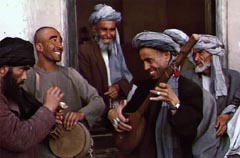 Brumberg noted that, with Rabbani’s allies playing a significant role in the new interim government, the issue of whether anti-gay persecution will end remains in question. “Most of the players come from factions and groups that don’t have a good record on human rights,” Brumberg said. “So the best you can expect is that the new players will just ignore gay issues and will not continue with the excesses of the Taliban.”
Brumberg noted that, with Rabbani’s allies playing a significant role in the new interim government, the issue of whether anti-gay persecution will end remains in question. “Most of the players come from factions and groups that don’t have a good record on human rights,” Brumberg said. “So the best you can expect is that the new players will just ignore gay issues and will not continue with the excesses of the Taliban.”
With Rabbani passed over for the post of prime minister in favor of Karzai, Brumberg said reports have surfaced that the interim government is considering appointing Rabbani as the head of a newly created Afghan Supreme Court. Such a court would be responsible, among other things, for hearing cases involving human rights abuses. To call for trials or investigations of past human rights violations, including the persecution of gays, “will open a can of worms for these new people coming to power,” Brumberg said, because many of them have been involved in such violations.
“I can’t imagine in all of this there will be too much emphasis on gay rights,” he said. “I can’t imagine there will be any emphasis on gay rights. But it’s possible that the new regime would at least curtail some of the abuses of gays and women that occurred in the past. That may be about all you could expect.” (End of Blade report)
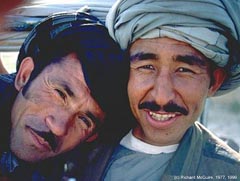
Two more similar stories about the recurrence of Pashtun homosexuality, from the New York Times (February 2002) and Times of London (January 2002), can be found in the Afghanistan News & Reports 2002-04 .on this site.
(The photos in this story are not part of the news reports from the ‘L.A.Times’ or the ‘Blade’. They were collected randomly from the Internet and no attribution is made here about the sexual orientation of the people in the photos.)
Also see this story about gay Afghanistan on this site by American writer Michael Luongo who traveled to Afghanistan: Click Here
By Richard Ammon,
Maura Reynolds
and Lou Chibbaro
February 2002
Updated April 2008
Also see:
Islam and Homosexuality
Gay Afghanistan Stories
Gay Afghanistan News & Reports 2001 to present
Gay Afghanistan Photo Gallery



